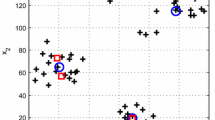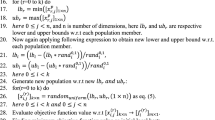Abstract
An algorithm selection method for black box design optimization problems is reported. It uses a simple and natural principle to select an algorithm set from a set of algorithm candidates. A set of benchmark problems is given, and the performance of each algorithm in the set is recorded in a knowledge base. Given an unknown problem, the default algorithm is run. An algorithm–problem feature is proposed and used to map to the most similar benchmark problem. Then the best algorithm for solving the problem is used in the second run. This process iterates until n runs have been made. The best result out of n runs is returned as the solution. Experimental results reveal that the algorithm–problem feature is a good problem identifier. Results are also reported when (1) both the training and testing set are the set of benchmark problems; and (2) the training set is the set of benchmark problems but the testing set is a set of real-world benchmark problems. The method works well on both scenarios. It attains almost the same performance as the best algorithm, and has better performance compared with random selection. As the best algorithm cannot be known a priori, the results confirm that the algorithm selection mechanism is effective. The performance of the algorithm as a function of n and the case when n is equal to two is also studied.





Similar content being viewed by others
References
BBOB benchmarks (2016) http://coco.gforge.inria.fr/doku.php. Accessed 5 Feb 2017
Bischl B, Mersmann O, Trautmann H, Preuss M (2012) Algorithm selection based on exploratory landscape analysis and cost-sensitive learning. In: Genetic and evolutionary computation conferences, GECCO. pp 313–320
Bischl B, Kerschke P, Kotthoff L, Lindauer M, Malitsky Y, Fréchette A, Hoos H, Hutter F, Leyton-Brown K, Tierney K, Vanschoren J (2016) ASlib: a benchmark library for algorithm selection. Artif Intell 237:41–58
Brest J, Greiner S, Boskovic B, Mernik M, Zumer V (2006) Self-adapting control parameters in differential evolution: a comparative study on numerical benchmark problems. IEEE Trans Evol Comput 10:646–657
Burke EK, Gendreau M, Hyde M, Kendall G, Ochoa G, Özcan E, Qu R (2013) Hyper-heuristics: a survey of the state of the art. J Oper Res Soc 64:1695–1724
Das S, Suganthan PN (2011) Problem definitions and evaluation criteria for CEC 2011 competition on testing evolutionary algorithms on real world optimization problems. Kolkata India; Singapore; Technical Report CEC 2011
Eiben AE, Smith JE (2015) Introduction to evolutionary computing, 2nd edn. Springer, Berlin
Eshelman LJ, Schaffer JD (1992) Real-coded genetic algorithms and interval-schemata. In: Foundations of genetic algorithms, FOGA. pp 187–202
Fong KF, Yuen SY, Chow CK, Leung SW (2010) Energy management and design of centralized air-conditioning systems through the non-revisiting strategy for heuristic optimization methods. Appl Energy 87:3494–3506
Fong KF, Lee CK, Chow CK, Yuen SY (2011) Simulation-optimization of solar-thermal refrigeration systems for office use in subtropical Hong Kong. Energy 36:6298–6307
Fukunaga AS (2000) Genetic algorithm portfolios. In: IEEE congress on evolutionary computation, CEC. pp 1304–1311
Gagliolo M, Zhumatiy V, Schmidhuber J (2004) Adaptive online time allocation to search algorithms. In: European conference on machine learning. pp 134–143
Grobler J, Engelbrecht AP, Kendall G, Yadavalli VSS (2011) Investigating the impact of alternative evolutionary selection strategies on multi-method global optimization. In: IEEE congress on evolutionary computation, CEC. pp 2337–2344
Hansen N (2016) The CMA evolution strategy. https://www.lri.fr/~hansen/cmaesintro.html. Accessed 25 May 2017
He J, Reeves C, Witt C, Yao X (2007) A note on problem difficulty measures in black-box optimization: classification, realizations and predictability. Evol Comput 15:435–443
Holland JH (1992) Adaptation in natural and artificial systems: an introductory analysis with applications to biology, control and artificial intelligence. MIT Press, Cambridge
Hüllermeier E (2005) Experience-based decision making: a satisficing decision tree approach. IEEE Trans Syst Man Cybern Part A: Syst Hum 35:641–653
Karaboga D, Basturk B (2007) A powerful and efficient algorithm for numerical function optimization: artificial bee colony (ABC) algorithm. J Glob Optim 39:459–471
Karafotias G, Hoogendoorn M, Eiben AE (2015) Parameter control in evolutionary algorithms: trends and challenges. IEEE Trans Evol Comput 19:167–187
Kerschke P, Preuss M, Wessing S, Trautmann H (2016) Low-budget exploratory landscape analysis on multiple peaks models. In: Genetic and evolutionary computation conference, GECCO. pp 229–236
Kotthoff L (2016) Algorithm selection for combinatorial search problems: a survey. In: Data mining and constraint programming, lecture notes in computer science, pp 149–190
Lam AYS, Li VOK, Yu JJQ (2012) Real-coded chemical reaction optimization. IEEE Trans Evol Comput 16:339–353
Liang JJ, Qu BY, Suganthan PN, Hernández-Díaz AG (2013) Problem definitions and evaluation criteria for the CEC 2013 special session on real-parameter optimization. Technical Report 201212, Zhengzhou University China and Technical Report Nanyang Technological University, Singapore
Liang JJ, Qin AK, Suganthan PN, Baskar S (2006) Comprehensive learning particle swarm optimizer for global optimization of multimodal functions. IEEE Trans Evol Comput 10:281–295
Lihu A, Holban Ş, Popescu O (2012) Real-valued genetic algorithms with disagreements. Memet Comput 4:317–325
Muñoz MA, Kirley M (2016) ICARUS: identification of complementary algorithms by uncovered sets. In: IEEE congress of evolutionary computation, CEC. pp 2427–2432
Muñoz MA, Kirley M, Halgamuge SK (2015a) Exploratory landscape analysis of continuous space optimization problems using information content. IEEE Trans Evol Comput 19:74–87
Muñoz MA, Sun Y, Kirley M, Halgamuge SK (2015b) Algorithm selection for black-box continuous optimization problems: a survey on methods and challenges. Inf Sci 317:224–245
Nguyen QH, Ong Y, Lim MH (2009) A probabilistic memetic framework. IEEE Trans Evol Comput 13:604–623
Particle Swarm Central (2016) http://www.particleswarm.info/. Accessed 25 May 2017
Peng F, Tang K, Chen G, Yao X (2010) Population-based algorithm portfolios for numerical optimization. IEEE Trans Evol Comput 14:782–800
Pitzer E, Affenzeller M (2012) A comprehensive survey on fitness landscape analysis. In: Recent advances in intelligent engineering systems, pp 161–191
Qin AK, Huang VL, Suganthan PN (2009) Differential evolution algorithm with strategy adaptation for global numerical optimization. IEEE Trans Evol Comput 13:398–417
Rice JR (1976) The algorithm selection problem. Adv Comput 15:65–118
Roy R, Hinduja S, Teti R (2008) Recent advances in engineering design optimisation: challenges and future trends. CIRP Ann 57:697–715
Smith-Miles K, Bowly S (2015) Generating new test instances by evolving in instance space. Comput Oper Res 63:102–113
Sörensen K (2015) Metaheuristics: the metaphor exposed. Int Trans Oper Res 22:3–18
Storn R, Price K (1997) Differential evolution: a simple and efficient heuristic for global optimization over continuous spaces. J Glob Optim 11:341–359
Suganthan PN (2016) Benchmarks for evaluation of evolutionary algorithms. http://www.ntu.edu.sg/home/epnsugan/index_files/cec-Benchmarking.htm. Accessed 25 May 2017
Tang K, Peng F, Chen G, Yao X (2014) Population-based algorithm portfolios with automated constituent algorithms selection. Inf Sci 279:94–104
Turkey M, Poli R (2014) A model for analysing the collective dynamic behaviour and characterising the exploitation of population-based algorithms. Evol Comput 22(1):159–188
Vrugt JA, Robinson BA, Hyman JM (2009) Self-adaptive multimethod search for global optimization in real-parameter spaces. IEEE Trans Evol Comput 13:243–259
Wang Y, Cai Z, Zhang Q (2011) Differential evolution with composite trial vector generation strategies and control parameters. IEEE Trans Evol Comput 15:55–66
Wolpert DH, Macready WG (1997) No free lunch theorems for optimization. IEEE Trans Evol Comput 1:67–82
Yang X-S, Deb S (2009) Cuckoo search via Lévy flights. In: World congress on nature and biologically inspired computing, NaBIC. pp 210–214
Yang X-S (2009) Firefly algorithms for multimodal optimization. In: Stochastic algorithms: foundations and applications, SAGA, pp 169–178
Yuen SY, Zhang X, Lou Y (2015) Sequential learnable evolutionary algorithm: a research program. In: IEEE international conference on systems, man, and cybernetics, SMC. pp 2841–2848
Yuen SY, Zhang X (2015) On composing an algorithm portfolio. Memet Comput 7:203–214
Yuen SY, Chow CK, Zhang X, Lou Y (2016) Which algorithm should I choose: an evolutionary algorithm portfolio approach. Appl Soft Comput J 40:654–673
Zambrano-Bigiarini M, Clerc M, Rojas R (2013) Standard particle swarm optimisation 2011 at CEC-2013: a baseline for future PSO improvements. In: IEEE congress on evolutionary computation, CEC. pp 2337–2344
Zhang J, Sanderson AC (2009) JADE: adaptive differential evolution with optional external archive. IEEE Trans Evol Comput 13:945–958
Zhang X, Fong KF, Yuen SY (2013a) A novel artificial bee colony algorithm for HVAC optimization problems. HVAC R Res 19:715–731
Zhang X, Zhang X, Yuen SY, Ho SL, Fu WN (2013b) An improved artificial bee colony algorithm for optimal design of electromagnetic devices. IEEE Trans Magn 49:4811–4816
Zhang T, Georgiopoulos M, Anagnostopoulos GC (2014) Online model racing based on extreme performance. In: Genetic and evolutionary computation conference, GECCO. pp 1351–1358
Acknowledgements
This study was funded by a grant from the Research Grants Council of the Hong Kong Special Administrative Region, China (Project No. CityU 125313).
Author information
Authors and Affiliations
Corresponding author
Ethics declarations
Conflict of interest
Shiu Yin Yuen declares that he has no conflict of interest. Yang Lou declares that he has no conflict of interest. Xin Zhang declares that he has no conflict of interest.
Ethical approval
This article does not contain any studies with human participants or animals performed by any of the authors.
Additional information
Communicated by V. Loia.
Publisher's Note
Springer Nature remains neutral with regard to jurisdictional claims in published maps and institutional affiliations.
Appendix
Appendix
See Tables 8, 9, 10, 11, and 12.
Rights and permissions
About this article
Cite this article
Yuen, S.Y., Lou, Y. & Zhang, X. Selecting evolutionary algorithms for black box design optimization problems. Soft Comput 23, 6511–6531 (2019). https://doi.org/10.1007/s00500-018-3302-y
Published:
Issue Date:
DOI: https://doi.org/10.1007/s00500-018-3302-y




